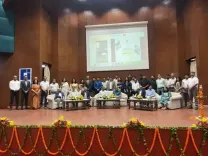Why Can't Skill Development Follow Prescriptive Templates?

Synopsis
Key Takeaways
- Empower States: States should craft local solutions for skill development.
- New Centres of Excellence: Establishment of centres in Hyderabad and Chennai for high-quality training.
- Focus on Quality: Investments in faculty development are crucial.
- Decentralized Planning: Collaboration with district collectors for localized skilling plans.
- Mandatory Certifications: CITS certification required for new instructors.
New Delhi, June 16 (NationPress) Skill development should not follow rigid templates; instead, it is essential to empower states to devise solutions that are tailored to their local economic realities and resonate with the ambitions of their youth, stated Jayant Chaudhary, Minister of State (Independent Charge) for Skill Development and Entrepreneurship, on Monday.
He emphasized that only through this approach can we achieve significant impact and enduring transformation, while addressing the audience at the Kaushal Manthan Regional Workshop organized by the Ministry of Skill Development and Entrepreneurship (MSDE) at Kanha Shanti Vanam, Hyderabad.
Highlighting his vision for a more flexible and responsive ecosystem, the minister announced the launch of two new Centres of Excellence — part of a wider plan to establish five nationwide — at National Skill Training Institutes (NSTIs) in both Hyderabad and Chennai.
These centres are intended to act as national reference hubs for exemplary instructor training and specialized skill development aligned with emerging industries.
Chaudhary stressed the necessity for states to adopt a more strategic, outcome-focused approach to skill development, ensuring it aligns with the aspirations of India's youth and the changing economic landscape.
Acknowledging the importance of quality training, he called for increased investments in faculty development by enhancing institutional capabilities, offering competitive salaries, and implementing stringent pedagogical standards.
He urged states to pursue a decentralized, data-driven planning model by collaborating with district collectors to formulate localized skill development plans, guided by comprehensive skill gap assessments in partnership with experts such as the World Bank.
Moreover, the minister mandated that CITS (Craft Instructor Training Scheme) certification be obligatory for all newly hired instructors, especially in newly established ITIs across states, emphasizing that this is vital for ensuring consistent, high-quality instruction nationwide.
Additionally, he proposed the creation of a robust grading and assessment framework for state-run ITIs to foster a culture of accountability, quality assurance, and performance-driven results. He encouraged states to utilize platforms like DISHA meetings to educate elected officials about the significance of skill development in promoting economic progress and social equity.
Key enablers for a globally competitive workforce were identified as stronger industry connections, an aspirational view of vocational education, and language training tailored for international opportunities. Acknowledging the time-intensive nature of investing in youth, the minister reiterated that such investments provide profound, long-term benefits — both for individuals and for the nation's overall advancement.









